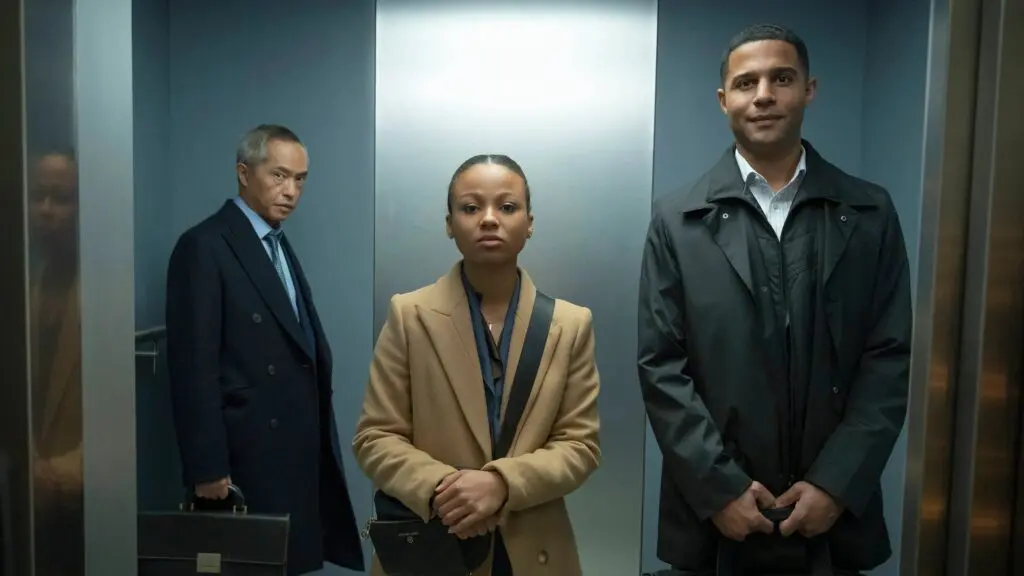When it debuted in 2020, Industry was something of a surprise. It came out of the gates as another darkly funny workplace drama about a cutthroat business attractive only to deplorable sociopaths, reminiscent of Succession, but then it gradually revealed itself to be a drug-addled sex-mad extravaganza of debauchery, reminiscent of Euphoria. As we reach season 2, everyone in it is awful, and the plot revolves largely around these uniquely awful people trying to feel their way around a career without totally succumbing to baked-in personal traumas and complete moral decline.
It’s like watching androids trying to pass as human survivors in a post-apocalyptic future. Anyway, I’ve watched every episode, discussed all my theories and main plot points, and placed them into a recap so you can read them as you watch.
Industry Season 2 Recap (Episodes 1-8)
Episode 1 – “Daddy”
That’s an apt comparison since Season 2 of Industry is very specifically about how the pandemic has ravaged the trading industry and the economies that keep it afloat. The season 2 premiere, “Daddy,” is framed mostly from Harper’s perspective since she has been working from her disorganized room at a chain hotel for the entire period, where she mostly lounges around in a robe, goes swimming, and complains about the burgers.
With the company’s New York branch sending an emissary to shake things up on the trading floor, Eric is adamant that Harper returns to the office and realizes her full and ruthless potential, though she returns to find the place almost unrecognizable – and her colleagues aren’t pleased to see her.
It’s through Harper and her hotel that we meet a new character, Jesse Bloom (Jay Duplass), a fellow American who has also moved to the U.K. after making a killing as a hedge fund type during Covid. Jesse seems like quite a nice guy, but Harper obviously sees him as a mark, and there’s an air of mystique about him that is obviously going to form at least part of this season’s backbone.
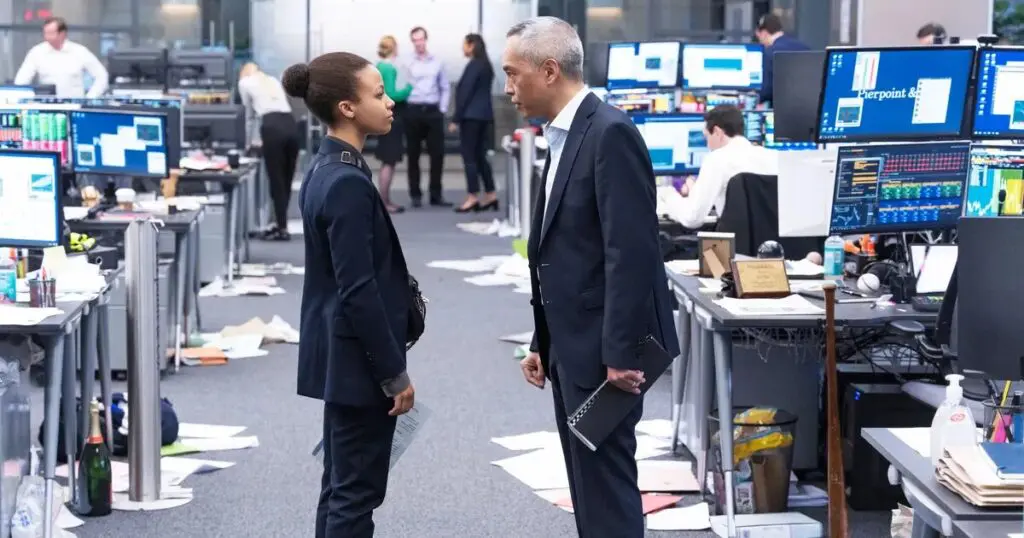
Industry season 2, episode 1 – “Daddy” (Credit – HBO)
Harper might need the connection, though, since things aren’t looking great at Pierpoint. Eric is stressed out by the arrival of the New York rep, Daniel Van Deventer, he’s frustrated by Harper having lost her edge while working remotely, and Robert, who is now on Eric’s desk, isn’t making any outgoing calls.
That last one is part of a string of details about a now-sober Robert having lost his confidence and sense of self-worth; he can pull the train into the station but can’t get any passengers to disembark, sexually speaking, and he doesn’t seem to have much of an identity beyond the coked-up city boy we saw all throughout the first season.
Others, meanwhile, have risen to positions of new power and confidence. Rishi, now engaged to an upper-middle-class woman with a podcast, is almost unrecognizable as he berates Harper for spending so long out of the office, and Yasmin has positioned herself as the de facto queen of her desk, relying on her family contacts and the absence of Kenny. She’s even taken to bullying the new hire, Venetia, mostly to make herself feel better.
But Yasmin’s fortunes take a turn when she loses her largest client in Maxim Alonso, who she sleeps with in light of the professional relationship being no more, and at whose party she meets Celeste Pacquet, a Pierpoint managing director who works with individuals of particularly high net worth and whom Yas initially, and amusingly, mistakes for a sex worker.
She might represent something of a lifeline for Yas, since the loss of Maxim, her volatile relationship with Harper, and the return of Kenny, who’s in recovery, all seem to make the trading floor less than ideal for her.
You get the idea, then – everyone’s struggling in different ways, though most of them related to personal excess in the last season and ambition in this one. Given this isn’t exactly a happy-go-lucky show, odds are that things will get worse before they get better, and there’s a virtual guarantee that many people will be hurt along the way.
Episode 2 – “The Giant Squid”

Industry season 2, episode 2 – “The Giant Squid” (Credit – HBO)
In the last episode, I flippantly implied the show was half Succession, half Euphoria, which I stand by, but I also think the comparison undersells Industry to some extent. There’s obviously some writing wizardry going on here to make such a group of obviously appalling people so appealing. And that intimate sense of not just the titular industry but how very wealthy and powerful people contextualize and rationalize their place and role in it is really the secret.
See, almost everyone here knows they’re awful. Yas even says it aloud at one point. But there’s a level above, occupied by people like Eric, where the responsibilities of the job have deluded them into believing that they’re fulfilling some kind of important, noble function rather than helping people with far too much money either make more of it or lose it all.
Harper returning to the office at the end of the episode to the enthusiastic applause of her co-workers, after so long spent walking onto the floor hiding within the noise of her headphones, is really her taking the first few steps toward becoming a person who no longer recognizes themselves.
This is what happens, I suppose, when every aspect of your life becomes transactional. If the deal gets done, then who cares what made it happen? We see this all over the place in “The Giant Squid”.
Yas’s father returns out of the blue, and while they obviously have all kinds of longstanding and unaddressed personal issues, a somewhat touching reminiscence at dinner turns to Yas bluntly asking daddy if he’s thought about having Pierpoint manage his wealth.
Robert wines and dines Nicole, lets her give him a hand job, and calls her “Mommy” just to get his name on a big sale. Even Gus is willing to let his skinny white one-night stand racially demean him, since whatever he gets out of the conquest presumably outweighs the insult.
What these people have to figure out now is who they want to be in order to make the biggest transactions. Harper can’t languish around as Eric’s protégé anymore, especially since his nominal authority seems to be waning, and Yas, now that her biggest client is in her bed but no longer in her books, can’t just coast on her “publishing heiress” curb appeal.
This is how we get her mentor-mentee relationship with Celeste; it’s what attracts Harper to Jesse Bloom; it’s there in how Robert immediately becomes subservient to Nicole (and gets over his sexual hump in the process). Remember, these aren’t the wealthy people who make the world go around; they’re the rank-and-file who make the wealth go around. They can – and will – be whoever they need to be, whatever their clients want. But they never stop to ask what the real cost might be.
Episode 3 – “The Fool”
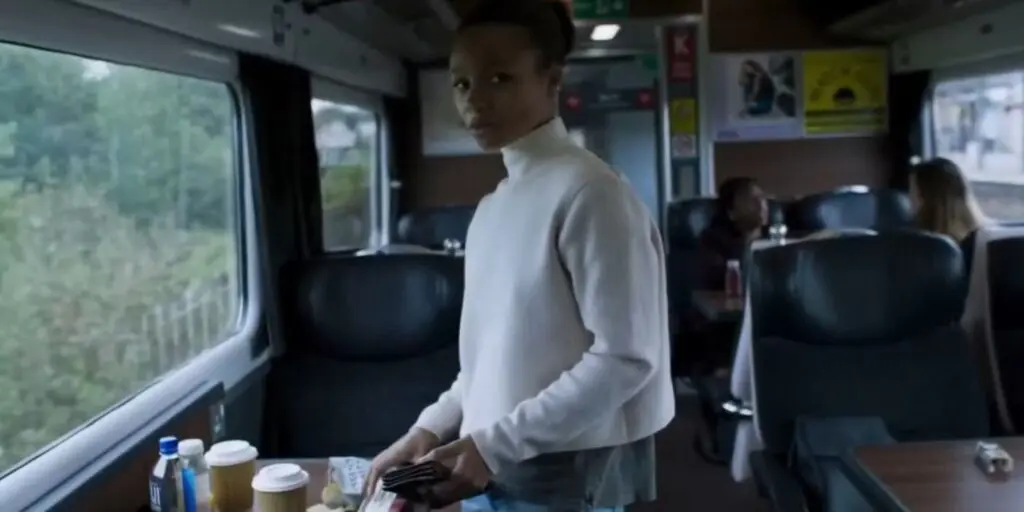
Industry season 2, episode 3 – “The Fool” (Credit – HBO)
You miss all of the shots you don’t take, or so the expression goes, but it’s worth asking whether the problem in Industry is who you’re hitting when you pull the trigger. This is partly a figurative point, but “The Fool” makes it surprisingly literal during a hunting trip to Wales that is almost cartoonishly obvious in being a metaphor for old money versus new.
Someone like Jesse Bloom – an American, no less, which doesn’t go unremarked upon – might not have any idea how a shotgun works or even what a pheasant is, but if he messes around for long enough, the pellets are going to go somewhere.
Harper wants all of Jesse’s pellets in her basket, and despite Industry being a deeply horny show, that isn’t a euphemism. Because Jesse represents not just a heavy new client but also a sure path to personal advancement for her that’ll allow her not just to get out from underneath Eric – again, not a euphemism – but actually trample him into the ground on her way to the top.
She has spent too long being subservient and being spoken to accordingly. Now she’s ready to usurp the master, Sith style, and “The Fool” plays it out in the final scenes with the same white-knuckle panache it reserved for Harper securing Jesse as a client last week.
Harper and Eric trying to one-up each other on this trip form the bulk of the episode, but the theme of friends becoming enemies and enemies becoming friends is reflected all over the place elsewhere. Yas realizes that Celeste isn’t all sunshine and rainbows and sexually charged client dinners; she turns to Kenny, of all people, for a bit of a favor, and he impresses, though perhaps because something like crypto is probably right in his wheelhouse. But you take the point.
Likewise, after a long episode of indignities, Yas finds herself calling on Harper. She isn’t there, of course, but the intention to potentially patch things up is worth making a note of. And it allows Yas and Robert some alone time to have an incredibly leading conversation about what might have happened to their relationship had they actually had sex rather than beating around the bush – that actually is a euphemism this time – for an entire season.
I always enjoy it when these two interact because Robert totally sees through Yas but just can’t help himself; him tapping out and heading to bed here made me laugh. It’s better to be safe than sorry.
Plus, Robert hasn’t exactly gotten over his sexual issues – we see him trying it on with Harper in “The Fool” and not quite meeting expectations, so it seems like Nicole remains the only person able to tickle his pickle at the moment. This is clearly building to some kind of payoff, but it’s hard to tell right now what it’ll be. And while we’re on the subject of “I’m not sure I like where this is going” subplots, Gus tutoring Jesse’s rebellious son is absolutely going to cause some problems for everyone.
Episode 4 – “There Are Some Women…”

Industry season 2, episode 4 – “There Are Some Women…” (Credit – HBO)
The most telling moment of the episode is when Eric is eventually given the unceremonious chop by someone he hired. In this world, you nurture and raise a creature just for it to eat you eventually.
I wouldn’t say this episode seeks to make us sympathize with Eric, but it definitely wants us to understand why he needed to calcify his feelings for his own protection. Even his closest mentors were racist to him. But he took what he needed from them; learned at their feet, followed at their heels. He learned to put up with it. So, he’s probably not surprised when the people he mentored start tightening the hangman’s noose. But it still stings. How can a man known colloquially as “The Terminator” be reduced to this?
It’s about compartmentalization, really. Eric learned to close off the parts of himself that were vulnerable and protect them with callouses. But that meant being closed off from his family, too, and presumably his friends, though we’ve never been given reason to believe he has any. It’s becoming increasingly apparent that in finance, the only way to survive is to lop off the pieces of yourself you’re least attached to, like Aron Ralston – the climber James Franco played in 127 Hours – hacking off his own arm to save the rest of himself.
What emerges as a theme in “There Are Some Women…” is what happens when you realize the cost of those sacrifices. It’s about the slow realization that if you’re willing to give away so much of yourself eventually you’ll be forced to part with something you’d have rather kept.
There’s a surprisingly sympathetic moment here when Harper casually reveals to Robert that Nicole made a move on her, and that sudden realization that he isn’t special or unique to her visibly crushed him. He’d essentially prostrated himself at her feet for the sake of a sale, and to her, he’s just another asset to be used.
We don’t see Robert reckon with this news, but we presumably will soon. But we do see Yas reach a similar personal crisis. Hers isn’t related to sacrifice, per se, but to the fact she’s never had to sacrifice anything.
Even during the height of the Covid-19 pandemic, which for many was the worst and most trying period of their lives, Yas, the heiress of a publishing fortune, never worried about money. She never altered her lifestyle. She simply did what she always had, which has always been whatever she wanted.
But now, in moving her father’s finances to Pierpoint, or at least attempting to, she’s opened the door of a closet rackety with skeletons. Daddy’s various indiscretions have tied most of his money up in long-term non-disclosure agreements, buying the silence of women. He’s adamant that he still has many lifetimes’ worth of dough left, but I’m not convinced. And neither is Yas.
Yas’s coke-fuelled meltdown about this takes the place of the usual high-pressure sale moment. It’s a different tone but no less effective. Marisa Abela is sublime here, and Harper no-selling her reaction is great too. That faux-sympathetic “I’ll get you some water” moment is basically Harper saying, “Welcome to the real world.” She’s probably long overdue a visit.
The other significant development involves Harper hooking up with DVD, presumably in a kind of “keep your friends close…” plot, since she immediately explains to Bloom that she’s keeping an eye on him because she’s well aware that he’s “a sales guy”. And you can never trust those.
But it must be depressing when every platonic and sexual relationship you have has to operate on these terms, when the people you like and trust are always the ones who end up wielding the axe that cuts you down to size. Really, there’s no wonder these people take drugs.
Episode 5 – “Kitchen Season”
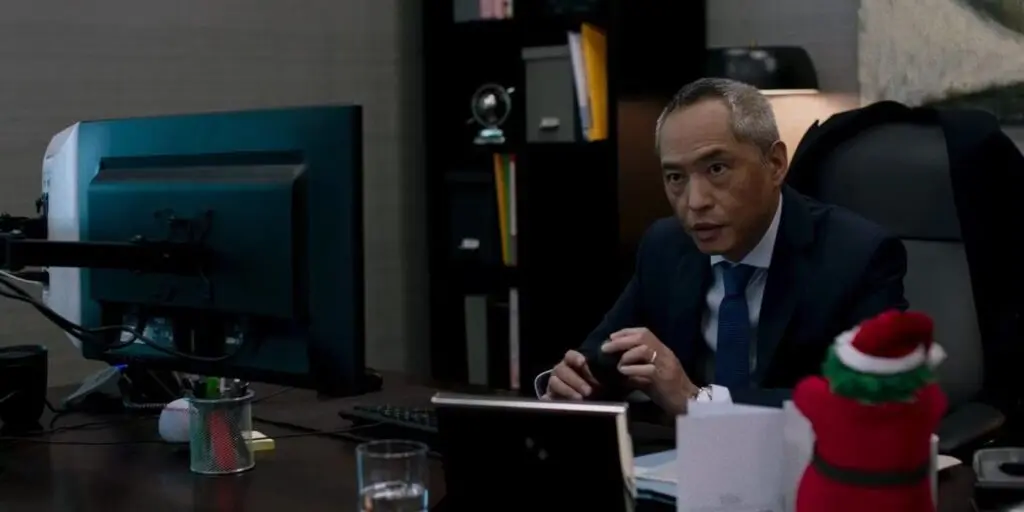
Industry season 2, episode 5 – “Kitchen Season” (Credit – HBO)
Everyone wants to be a good parent; not everyone knows how to be. And hurt people hurt people, it turns out, whether that’s physically, emotionally, or through mismanaged financial investments. Our three main characters are all products of neglect, in one way or another, some more obvious than others. Thus far throughout this season, Yas’s relationship with her father has come to the fore, and the extent of his infidelities continues here, but we didn’t quite realize how much she had in common with those she tries so eagerly to position herself above.
But let’s start with Yas since her continental home-away-from-home in Berlin is the setting for much of the drama. With her new position with Celeste, she needs to smooth the hand-off of her most lucrative client to Jackie, and since Harper has previous with the client and a long-lost brother potentially living in the city, she pulls some strings with Eric – who is clearly relishing the opportunity to cause some bother – to get herself on the trip. The three of them stay in Yas’s father’s place, which languishes empty but is still maintained by a cleaner, seemingly for no reason.
At one point, Yas says, entirely without irony, “It feels good to be back on the Continent.” It’s a post-COVID remark, but you can also take it as her being happy to return to an idealized family past, where framed photos of the beloved nanny sit on the mantels.
Throughout the episode, Yas intuits and eventually confirms that her father was sleeping with that nanny for quite some time. She never knew – or perhaps she always did. This is someone who caught her mother cheating on at least one occasion, though probably more. Familial and sexual dysfunction is essential to her very identity.
Harper’s parental misgivings are a little more ambiguous, but as we learn here in “Kitchen Season”, her mother was enough of a dragon to send two children fleeing. Harper’s brother works in a kitchen in Berlin and is a recovering crystal meth addict. She hasn’t seen him in years and didn’t even know he liked a drink, let alone Class A substances.
Through their dialogue, we can glean that he was once a promising tennis player who was pushed to a degree that constituted abuse. Within moments of seeing his sister after God knows how many years, he has already relapsed. All the qualities that make her good at finance, all the aspects she prides herself on, are triggers for him, reminders of a dehumanizing past that he literally fled from.
And then there’s Robert. His background has always been framed in class terms; he doesn’t come from money but instead worked his way into it. The weight of expectation on him was using his drive and his intelligence to free himself from his circumstances, from the working-class lager-lout demeanor of his father. He attempts to dangle his success over his father this week and only finds himself descending once again into the bottom of a bottle and a bag, the second relapse in a single episode.
But here’s the problem. In his compromised state, Robert meets with a potential employee and, in all his bluster, manages to coax her into Pierpoint. At his lowest personal ebb, he achieves professional success. What is that going to tell him about himself?
A stoic Harper, returning to work without her brother, seems more emotionally closed-off than ever, snapping at DVD after a moment at the top of the episode in which he asked her if she’d allow him to be vulnerable for a moment. I think we all know the answer to that. None of these people will allow anyone to be vulnerable – least of all themselves.
Episode 6 – “Short to the Point of Pain”
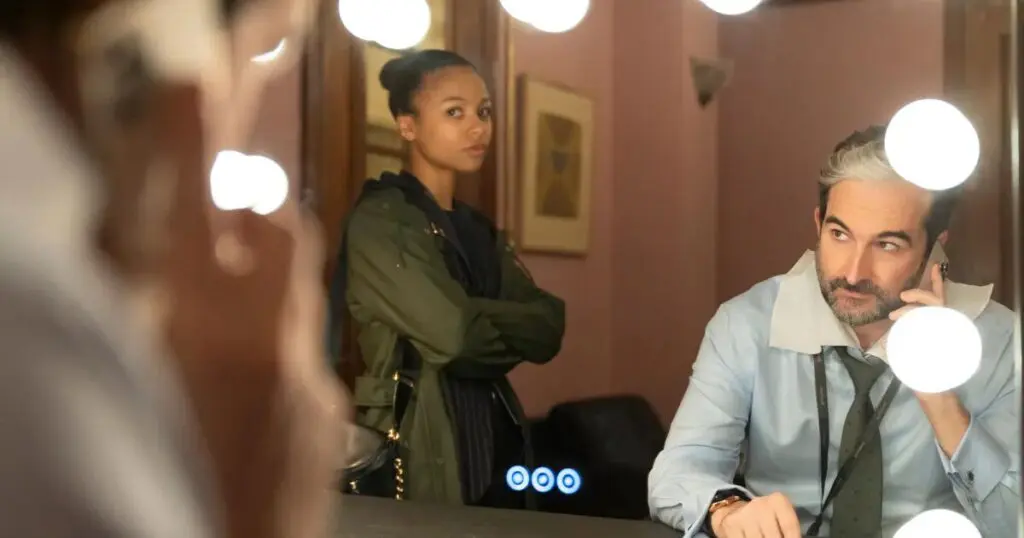
Industry season 2, episode 6 – “Short to the Point of Pain” (Credit – HBO)
The problem is Reddit, I think. During the height of the pandemic, there was a big to-do about Gamestop, the long-running video game retailer that was facing financial annihilation like most brick-and-mortar retailers and had been shorted into near ruin by hedge funds – shorting being the process of borrowing shares of a stock that the investor believes will decline in value with the intention of buying them back for less money than they paid and traded for initially.
Only, this didn’t happen since a bunch of nostalgic Redditors coordinated a short squeeze of Gamestop shares, pushing the value up, not down, and forcing many of the hedge funds to buy back shares to minimize losses, thus driving the share price up further still.
This is what is happening to the stock that Jesse Bloom is trying to short, and a lot of the tension of the episode comes from Harper obsessively monitoring the share price. It says a lot about Industry that this isn’t just entertaining but actively riveting.
And it amounts to a major moment in which Harper stabs Rishi in the back to try and bluff Jesse back into the game, which results in DVD banishing her from the trading floor and will potentially – probably, even – mean the loss of her job at Pierpoint.
But Harper has bought into the idea – fostered by Eric, whose promotion has turned him into a kind of laconic soothsayer dispensing wisdom from a cloud of cigarette smoke on the street outside – that so long as she can secure a client like Bloom, she’s bigger than Pierpoint. She can go wherever she wants. The question now becomes whether she can remain in Bloom’s good graces or her luck will run out. We’ll have to see.
In some ways, this is a neat continuation of last week’s episode, which was about how the personal, and family lives of these people have made them well-suited to this particularly cutthroat industry and posited the question of whether, when faced with the option, they’d chose who they are or who they ultimately want to be.
For Harper, that answer is obvious – she wants to be a winner, so she’ll always pursue the next level of success, regardless of whose head she has to trample on to get there. For someone like Yas, who, in her own words, has won many lotteries in life already, she’s pursuing something more meaningful than simply financial ambition. And that seems to be a relationship with Celeste.
Those two hook up this week, and I can’t have been the only person who clocked the look on Yasmin’s face when Celeste revealed that she was in a polyamorous relationship with a wife who already knows about Yas. To the heiress, this kind of ill-advised but deeply intense liaison seemed like the inexorable pull of fate bringing them both together. She’s visibly uncomfortable with the idea of being a component in someone else’s marital “arrangement.” Where might this lead?
I’m pleased to report in the meantime that Gus actually gets something to do in “Short to the Point of Pain,” and it’s pretty meaningful. For one thing, his relationship with Leo means that he’s right in the middle of Bloom’s attempts to reconnect with his estranged son, so that’s a predicament, but he’s also discovering that the work he finds most valuable and fulfilling might not necessarily be the highest-paid or most prestigious.
He’s currently working for a local left-wing politician but has become a kind of ad-hoc therapist for a deeply troubled but volatile Liverpudlian, all of which he finds meaningful, but his family doesn’t see it that way and thinks he should feel obligated to provide the same kind of life for his kids as he was given – otherwise, what’s the point in all the investment?
It’s a relevant question in a show about finance, I suppose. But since Gus has now quietly become the moral center of the entire thing, I can’t help but root for him to do what makes him happy.
Episode 7 – “Lone Wolf and Cub”

Industry season 2, episode 7 – “Lone Wolf and Cub” (Credit – HBO)
The employees of Pierpoint are more compelling than George R. R. Martin’s Aryan dragon-riders and Tolkien’s bigfooted overeaters because, if you squint a little, they’re recognizable human beings. They’re governed by the same sort of moral compass, and their ethical dilemmas are easy to imagine yourself in.
You know what you’d do in an uncomplicated battle between good and evil. But whether you’d stab a co-worker in the back to secure your financial future is another matter entirely.
Most people like to believe they wouldn’t do half of the things that Harper Stern is willing to do, but it’s funny to watch how many people in the show keep tumbling into her orbit and finding themselves emulating her more closely than they ever imagined.
People are like that – most aren’t willing to be the first, but they’ll happily follow the leader. Even DVD, ostensibly Harper’s higher-up, immediately shifts into self-preservation mode when he recognizes he has been outmaneuvered and displayed a vulnerability.
DVD’s vulnerability is one that several characters also exhibit in “Lone Wolf and Cub” because the industry they have devoted so much of themselves to is beginning to ask too much of them.
Financial management doesn’t just demand ungodly hours and personal sacrifice, but also, apparently, turning a blind eye to outright criminality, or at least excusing it as a necessary consequence of some nebulous bigger picture. In that sense, it’s Venetia, of all people, who cracks a window and allows something resembling humanity to creep in.
It starts with Nicole, Rob’s high-powered client whose considerable finances seem to be a conduit for ill-advised sexual relationships with whoever happens to be looking after her accounts at the time.
First, it was Harper, then it was Rob, and now that Rob has found out about Harper, he’s trying to establish some boundaries, which means that Nicole is obviously frustrated with him. Venetia opting to intrude on their latest dinner and play the Pierpoint game in order to get face time with a client is the equivalent of a gazelle ambling into the lion’s den right around feeding time. Because Rob feels exploited by Nicole and insulted by Venetia, he leaves them to it, and the next thing we know, Venetia is reporting a sexual assault.
Nicole’s behavior is nothing new. But calling that behavior out for what it is sends everyone into a tailspin. Venetia goes to Yas for advice, and the heiress only condemns herself by lightly belittling the experience and advising Venetia not-to-subtly to keep quiet about it, especially since Nicole is a big client.
So, Venetia goes to Kenny, who reports it to DVD, and just like that, the news is everywhere. Predictably, hardly anyone cares, least of all the top brass, who can scarcely find a moment to acknowledge an HR issue.
But DVD cares, and eventually, so does Rob, especially since the guilt of having done only the bare minimum to protect her weighs heavy on his conscience (and makes him culpable). Everyone seems to realize all at once that the culture of complicity at Pierpoint is deeply dangerous and that the upsides aren’t worth the moral cost.
Or are they?
It depends on who you ask. Rob makes the right decision by revealing that Nicole’s behavior is a pattern that began with Harper and then continued with him, and DVD – rather arrogantly, I suppose – immediately assumes that the trauma of Nicole’s come-on is what prevented her from carrying on a relationship with him.
He calls Harper to say he understands what she’s been holding in and going through, and in so doing, he exposes a weakness that Harper immediately exploits by roping him into a scheme she’s cooked up with Eric and Rishi to set up in a new firm with Jesse Bloom’s custom as their trump card. Trust Harper to turn a moment of profound personal dismay into an opportunity for herself.
Episode 8 – “Jerusalem”
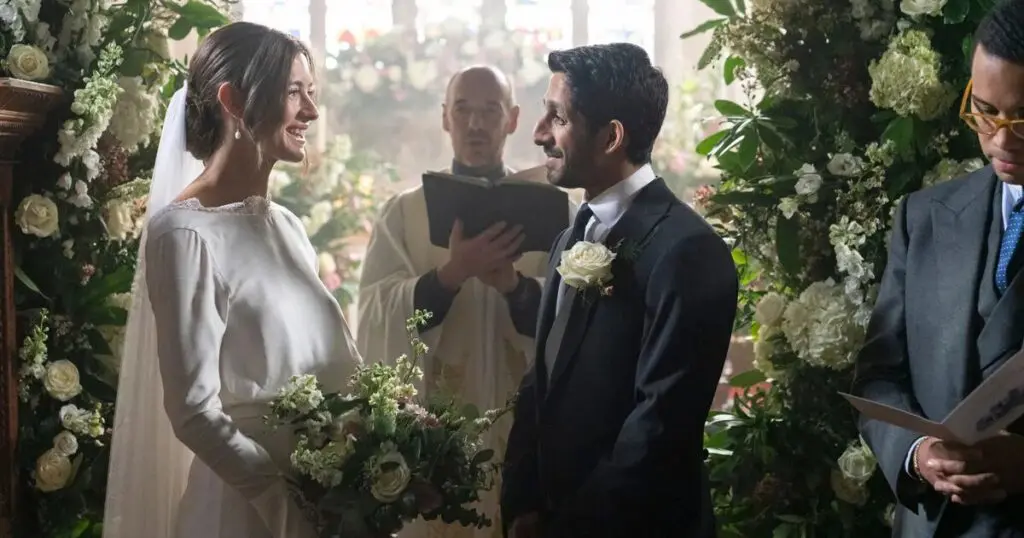
Industry season 2, episode 8 – “Jerusalem” (Credit – HBO)
You’ll recall that at the end of the penultimate episode, Harper, Eric, and Rishi has recruited DVD into their little scheme to be hired at another company on the strength of Jesse Bloom’s public persona and infinitely deep pockets. But this plan is thwarted by the fact that a) Harper doesn’t exactly have Jesse’s loyalty at the moment and b) the move would require everyone to relocate to New York, which they didn’t want to do when it was suggested by Pierpoint in the first place.
Rapidly running out of options, Harper callously grills Gus for the word on what’s happening with FastAid, Rican, and the NHS, makes some assumptions based on his silence, and then takes the information to Jesse and advises him to tap out of his short before he hemorrhages any more money.
But Jesse knows Harper lives with Gus, who works for Aurore Adekunle, so he goes on TV and makes several leading anti-cronyism statements to move the market around. By torpedoing the FastAid acquisition and positioning Rican as the likeliest home for the NHS contracts, Jesse is going to make money on both ends of the deal. “Almost like he planned it,” DVD astutely notes.
And of course, he planned it, which is probably my favorite development of this finale. Until now, Jesse has been consistently depicted as a guy with a ton of money that he might have acquired by chance during the pandemic.
There have been glimmers throughout that he knows what’s doing, moments when he switches into a different mode and lets the laidback persona fall by the wayside, but nothing to really suggest he was capable of such a ruthless long con. It’s a brilliant maneuver, and when he jets off with Gus, of all people, it feels like a supervillain having recruited his new sidekick.
The problem for Harper is that Jesse’s use of the knowledge she gave him to manipulate the market constitutes insider trading. She’s been done. Her only option now is the MHFS – Macro Hedge Fund Sales – “super team” that Eric pitches to Adler.
During the meeting, Harper and Eric sell out both Rishi and DVD, and Harper offers to testify that Nicole sexually assaulted her to leverage the scandal. Adler buys the idea. Rishi survives the cut, but Harper saunters past DVD, realizing his access card won’t get him into the building anymore. (This, by the way, comes right after Harper has sex with Rishi on the night before his wedding, since why not?)
Industry Season 2 Ending Explained
It’s after that when Harper gets fired because of the whole forged degree thing. It seems like a bit of an anticlimax, really, but such is the way of things – if you tell enough lies, you’ll never be able to predict the one that’ll eventually ruin you.
Elsewhere in “Jerusalem,” Yasmin has an absolutely terrible episode. After she learns from Celeste that her dad tried it on with her back in the day – along with the information that three of the department’s clients were named in Jeffrey Epstein’s black book, which is presented as a kind of perverted defense for managing the finances of some truly terrible men – Yas confronts him about that and potentially grooming the family nanny.
Her dad goes absolutely ballistic, savages Yas’s entire existence, cuts her off from the family finances, and locks her out of the house. When she tells Celeste that they won’t be representing her father, Celeste reminds her that her father is the only value that she brings to the seat. Like Harper, Yas is essentially done.
So, where does she go? Yes, to Robert. And while she apologizes for using him, she doesn’t suggest she’s going to break the habit, instead pushing him to acquire some coke for her, which he’s caught with during a routine traffic stop.
His job is also imperiled on the back of this, and he’s thrown in the drunk tank until Nicole bails him out. He’s still furious with her about being a predator, but she belittles the accusation, as well as everyone who has been a victim of her.
Presumably seeing no better option at this point, Robert gives himself back over to her. Somehow, he had the happiest ending of just about anyone.
And that completes my recap of Industry Season 2. What was your favorite episode and why? Comment below.

